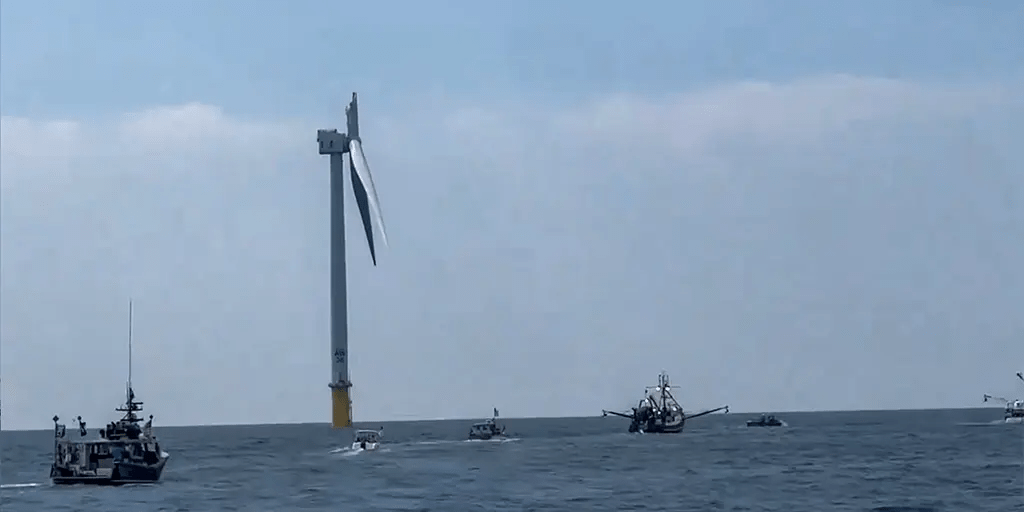Reposted with permission from Legal Insurrection
by Leslie Eastman
I am continuing to keep an eye on the Vineyard Farms offshore blade failure near Nantucket. A few weeks ago the facility was closed because of the failure of Vineyard Wind’s newly installed wind turbines, and the city was poised to sue.
After one blade failed and ended up in the water, the beaches were cluttered with sharp fiberglass shards, which is a sub-optimum condition at the height of the summer tourist season. Continuing investigation into the cause of this environmental contamination incident determined that a manufacturing flaw in the blade was responsible for the failure.
Now this weekend, a “flotilla” of about two dozen commercial and recreational fishing vessels steamed to the wind farm on Sunday to protest offshore wind development.
The vessels, hoisting anti-offshore wind flags and blasting air horns, departed early Sunday morning from ports in New Bedford, Nantucket, Martha’s Vineyard, Rhode Island and along the Cape, converging at about noon on the site of the crippled Vineyard Wind turbine.
“The blade collapse was an eye-opener to a lot of people who before didn’t know that offshore wind is a disaster for the ocean,” said Shawn Machie, 54, who is captain of the New Bedford scalloper F/V Capt. John.
…The “flotilla” protest was organized by the New England Fisherman’s Stewardship Association (NEFSA). Plans kicked into gear when Dan Pronk, captain of lobster boat F/V Black Earl, was collecting turbine debris that had washed up on the shores of Nantucket. He called Machie and other New England fishermen who said they felt they had to “do something before it’s too late,” Machie said.
“We feel like our jobs are just accepted as collateral damage,” Machie said. “We are regulated for sustainability. And that makes sense. We need regulation. But offshore wind is allowed to kill fish and wreck nurseries without any manageable stopping point.”
The protesters indicate the impact on their industry will be more significant than many appreciate…because they can’t trawl on former fishing grounds.
Otto Osmers, a commercial fisherman from Martha’s Vineyard, made the journey from Menemsha at 7 am on Sunday, arriving at the Vineyard Wind site around 10:30 am. Osmers conceded that offshore wind projects like Vineyard Wind can block trawling and crab trap routes, but had other concerns about the project. “The ocean is one of the last undeveloped places on earth,” he remarked about the sight of so many large turbines peppering the horizon. “We put cables down there but it’s largely undeveloped. It’s sad to see that go away.”
Others were more passionate in their displeasure. Sue Zarba, who along with her husband John who fish recreationally, said seeing the scale of the turbines was emotional. “That was the first time I was up close to the turbines, and I was sobbing,” she said in an interview after the protest. “After you’ve seen this offshore wind farm, you cannot unsee it. Soon over one thousand acres just off the coast will be filled with turbines. We will never be able to undo this man-made environmental disaster.”
“This cannot continue because that’s where we fish,” said Zarba. “They’re developing on a tuna fishing ground. You can’t fish around turbines, you can’t trawl.” She added that her son, who attended the protest, was initially skeptical of her protesting but changed his mind once he saw the turbines.
However, their protests are being met with a deaf ear. The National Marine Fisheries Service issued a new biological opinion for flagship offshore wind project Vineyard that finds no adverse effects to endangered whales and other marine wildlife stemming from driving the array’s last 15 monopiles.
“It will have no effect on any designated critical habitat,” National Oceanic and Atmospheric Administration Fisheries said in a statement. “NOAA Fisheries does not anticipate serious injuries to or mortalities of any ESA-listed whale including the North Atlantic right whale.” The agency said that with mitigation measures, “all effects to North Atlantic right whales will be limited to temporary behavioral disturbance.”
In conclusion, the fishermen are doing the work that environmentalists used to do.
Related


